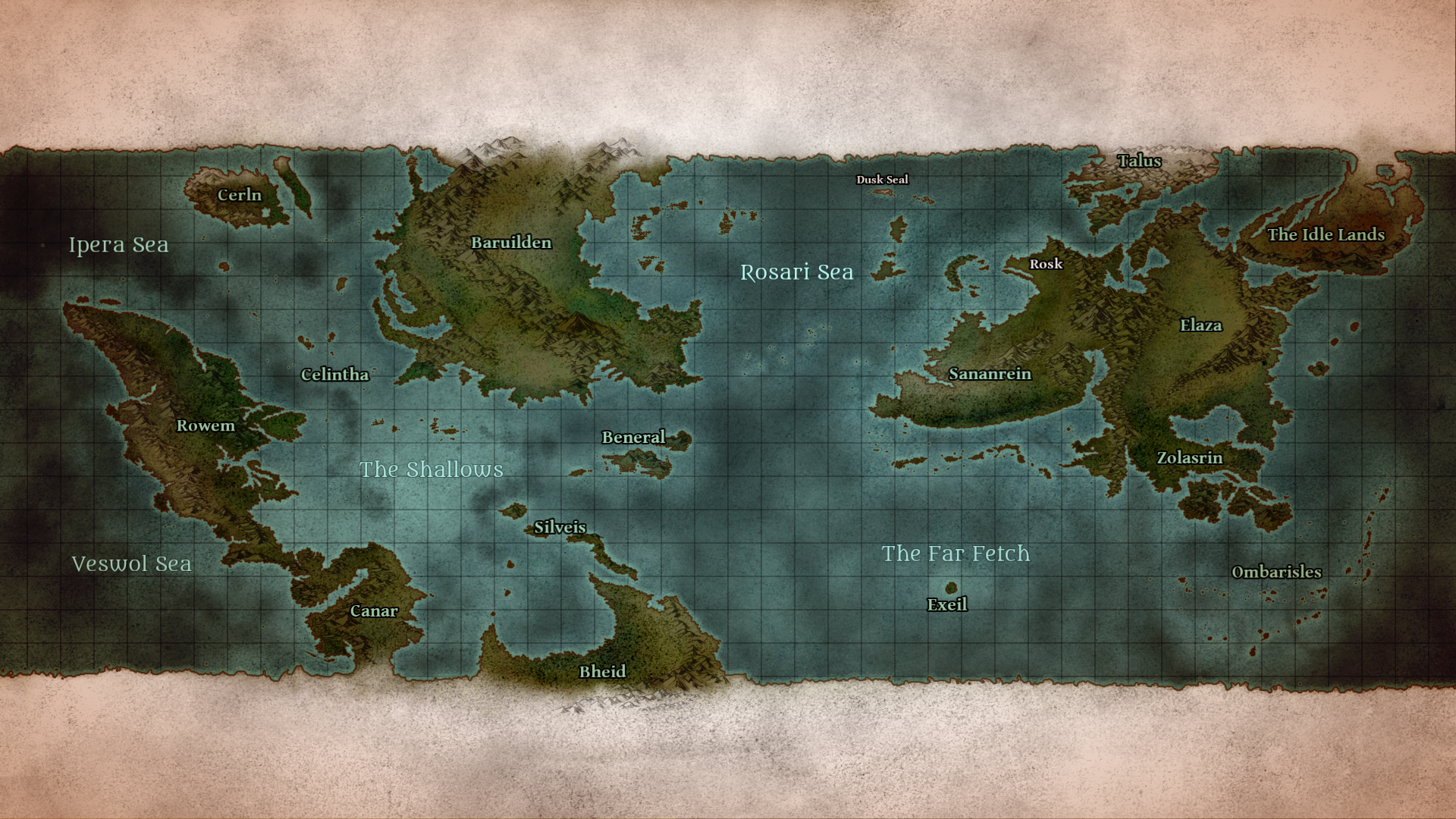Alyara, Language of the Alyaran.
Natively known as: alyara /ˈaljara/
...and he stood holding his hat and turned his wet face to the wind...fú ithr fingr ityirr œ ilmanr fú fingr bratar vá ándá err ekkakh
Pronunciation: /fú iðr fingr ˈitjirr œ ˈilmanr fú fingr ˈbratar vá ˈándá err ˈekkax/
Alyaran word order: and he his hat holding stood and his wet face the wind to turned
Spelling & Phonology
Consonant inventory: b d f g h j k l m n p r s t v x ð ʤ| ↓Manner/Place→ | Bilabial | Labiodental | Dental | Alveolar | Palato-alveolar | Palatal | Velar | Glottal |
|---|---|---|---|---|---|---|---|---|
| Nasal | m | n | ||||||
| Stop | p b | t d | k g | |||||
| Affricate | ʤ | |||||||
| Fricative | f v | ð | s | x | h | |||
| Approximant | j | |||||||
| Trill | r | |||||||
| Lateral approximant | l |
| Front | Back | |
|---|---|---|
| High | i í y | u ú |
| High-mid | e é | o ó |
| Low-mid | œ | |
| Near-low | æ | |
| Low | a á |
Stress pattern: Initial — stress is on the first syllable ? Spelling rules:
| Pronunciation | Spelling |
|---|---|
| y | ǔ |
| ð | th |
| j | y |
| ʤ | j |
| x | kh |
Grammar
Main word order: Subject Object (Prepositional phrase) Verb. “Mary opened the door with a key” turns into Mary the door with a key opened.Adjective order: Adjectives are positioned before the noun.
Adposition: postpositions ?
Nouns
Nouns have two cases:- Nominative is the doer of a verb: dog bites man.
- Accusative is the done-to of a verb: man bites dog.
Singular
| Definite | Indefinite | |
|---|---|---|
| Nominative | If ends with vowel: Suffix -rr
Else: Suffix -úrr óllrúrr /ˈóllrúrr/ the dog (doing the verb) |
If ends with vowel: Suffix -nn
Else: Suffix -inn óllrinn /ˈóllrinn/ a dog (doing the verb) |
| Accusative | If ends with vowel: Suffix -ss
Else: Suffix -ass óllrass /ˈóllrass/ (verb done to) the dog |
Suffix -a
óllra /ˈóllra/ (verb done to) a dog |
Plural
| Definite | Indefinite | |
|---|---|---|
| Nominative | If ends with vowel: Suffix -ðr
Else: Suffix -aðr óllrathr /ˈóllraðr/ the dogs (doing the verb) |
No affix
óllr /óllr/ some dogs (doing the verb) |
| Accusative | Suffix -ill
óllrill /ˈóllrill/ (verb done to) the dogs |
Suffix -ann
óllrann /ˈóllrann/ (verb done to) some dogs |
Articles
Alyaran encodes definite article ‘the’, and indefinite article ‘a’ in noun affixes. See Noun section.Pronouns
| Nominative | Accusative | |
|---|---|---|
| 1st singular | arr /arr/ I | athr /aðr/ me |
| 2nd singular | arth /arð/ you | a /a/ you |
| 3rd singular masc | ithr /iðr/ he, it (masc) | ar /ar/ his, it (masc) |
| 3rd singular fem | i /i/ she, it (fem) | akh /ax/ her, it (fem) |
| 1st plural | et /et/ we | ha /ha/ us |
| 2nd plural | ir /ir/ you all | van /van/ you all |
| 3rd plural | ethr /eðr/ they | ra /ra/ them |
Possessive determiners
| Possessive | |
|---|---|
| 1st singular | a /a/ my |
| 2nd singular | e /e/ your |
| 3rd singular masc | fingr /fingr/ his |
| 3rd singular fem | nallr /nallr/ her |
| 1st plural | ald /ald/ our |
| 2nd plural | ar /ar/ your (pl) |
| 3rd plural | ann /ann/ their |
Verbs
| Present | No affix
ostr /ostr/ learn |
| Past | Suffix -ep
ostrep /ˈostrep/ learned |
| Remote past | Suffix -ar
ostrar /ˈostrar/ learn (long ago) |
| Future | Particle before the verb: i -
i ostr /i ostr/ will learn |
Progressive aspect
The ‘progressive’ aspect refers to actions that are happening at the time of speaking, such as I am learning.Alyaran uses an affix for progressive:
| Progressive | If ends with vowel: Suffix -nn
Else: Suffix -enn ostrenn /ˈostrenn/ is learning |
Habitual aspect
The ‘habitual’ aspect refers to actions that happen habitually, such as I learn (something new every day), as opposed to actions that happen once (I learned something).Alyaran uses a standalone particle word for habitual:
| Habitual | Particle before the verb: a -
a ostr /a ostr/ learns |
Numbers
Alyaran has a base-10 number system: 1 - állr2 - inr
3 - ækh
4 - vo
5 - ær
6 - ánda
7 - angr
8 - ǔ
9 - arthr
10 - ágr
100 - athar
1000 - anhve
Derivational morphology
Adjective → adverb = Suffix -aAdjective → noun (the quality of being [adj]) = Suffix -a
Adjective → verb (to make something [adj]) = Suffix -ar
Noun → adjective (having the quality of [noun]) = If ends with vowel: Suffix -mr
Else: Suffix -imr
Noun → adjective relating to noun (e.g. economy → economic) = If ends with vowel: Suffix -r
Else: Suffix -ar
Noun to verb = If ends with vowel: Suffix -r
Else: Suffix -ar
Verb → adjective (result of doing [verb]) = If ends with vowel: Suffix -tó
Else: Suffix -ató
Tending to = Suffix -e
Verb → noun (the act of [verb]) = Suffix -œrl
Verb → noun that verb produces (e.g. know → knowledge) = Suffix -ir
One who [verb]s (e.g. paint → painter) = If ends with vowel: Suffix -fi
Else: Suffix -áfi
Place of (e.g. wine → winery) = If ends with vowel: Suffix -ni
Else: Suffix -ani
Diminutive = If ends with vowel: Suffix -r
Else: Suffix -ar
Augmentative = Suffix -ír


Comments